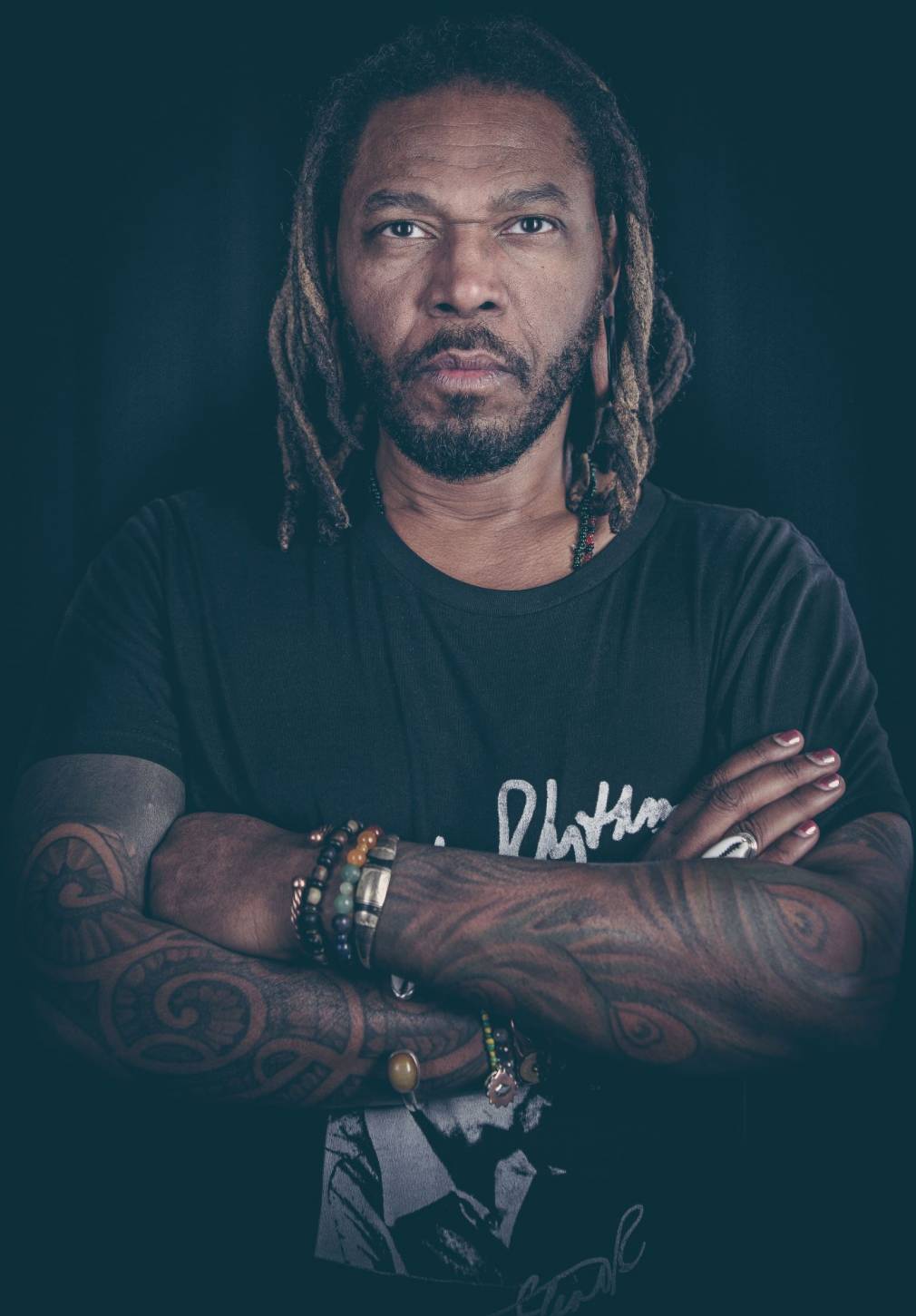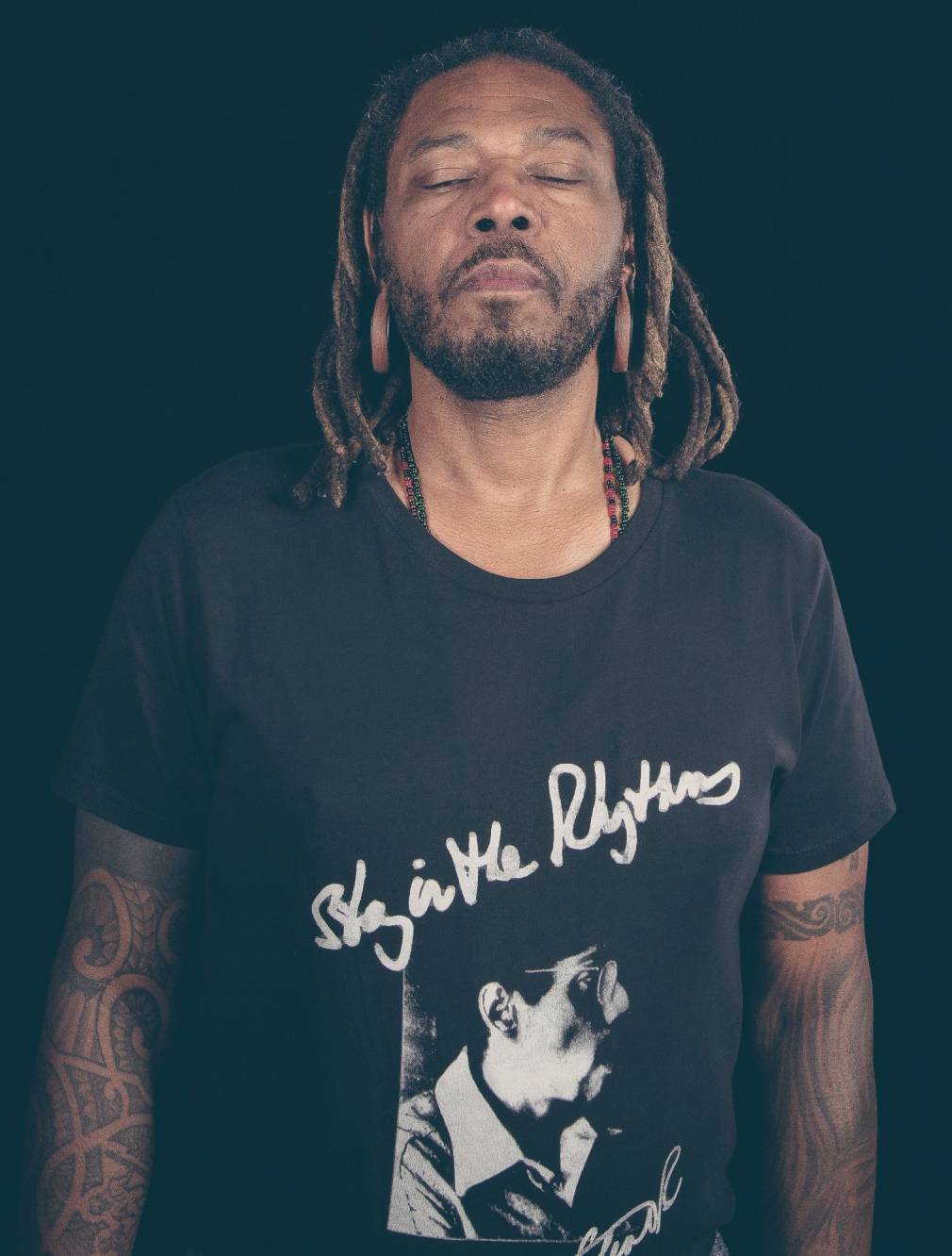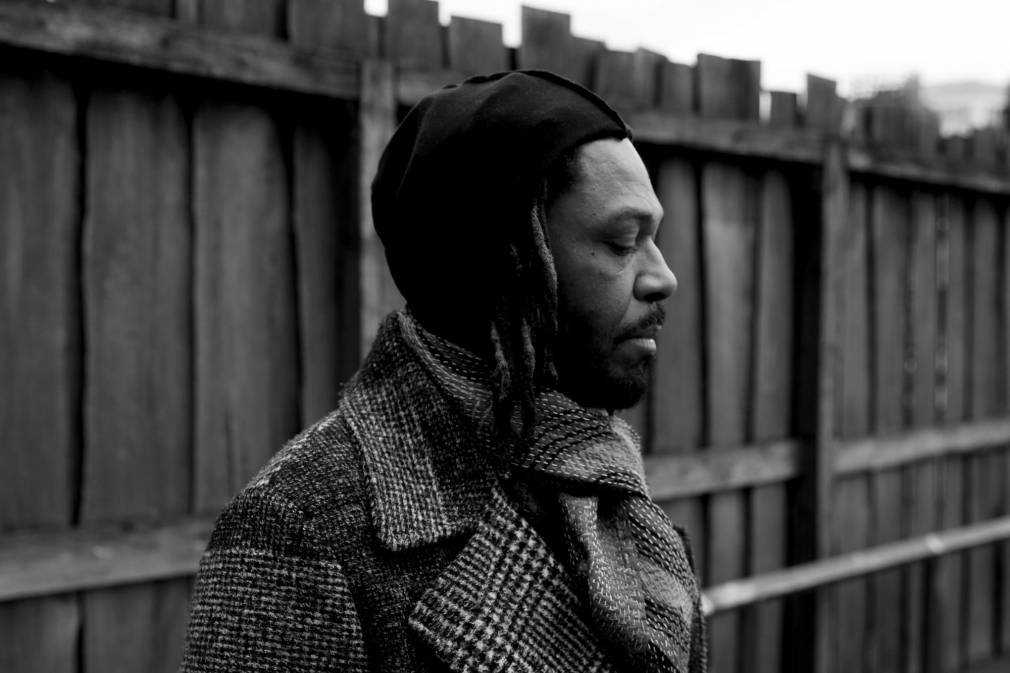With a career that spans four decades, Osunlade has become nothing short of a legend in the house music scene. Originally from Saint-Louis, Missouri, he started creating music early, having taught himself to play piano, drums, bass and guitar by the time he was a teenager. His professional career began in earnest in the late eighties, when he moved to Los Angeles as a producer for other artists. While the decade he spent on the West Coast was crowned with many commercial successes, he grew increasingly unhappy with the industry and its toxic practices. To maintain his passion for music, Osunlade left the business and took a two-year break. This marked the start of a spiritual journey that led him to Ifa, an ancestral religion that originates in Yoruba culture from present-day Nigeria, widely practiced in West Africa and among diasporic communities in the Americas. It also triggered a move to New York and enabled him to achieve the dream of founding his own label, Yoruba Records, as a place to release his own organic, vulnerable and mellow brand of music and introduce new talent to the world. With 20 albums and countless singles to his name – including collaborations with the likes of Salif Keita and Cesaria Evora to name a few – he is one of the most prolific artists in the game. Beyond his production and label work, Osunlade has also become a revered deejay who performed at leading venues the world over. In many ways, he is an artist who’s seen it all, and yet his music remains as fresh and soulful as ever. We are blessed to connect with the man – comfortably dressed in his robe, hanging out in a park with his dog – ahead of his headlining at the Offering Gotsoul Online Weekender.
While your music defies the concept of genre, you’re widely considered one of the founding fathers of “Afro house”. Is this a legacy you recognize and identify with?
Absolutely. And in fact, I love where it’s gone, too, with so many kids who are doing incredible things. I love seeing this creativity and listening to new music thinking to myself “I would have never done that!”. So yes, I recognize it, much in the same way that I recognize my own forefathers. People like Ron Trent, Joe Claussell, Louie Vega, and all those guys I looked up to when I was starting. It’s all a continuum. This said, I don’t feel a sense of responsibility with this legacy. My creative responsibility is limited to myself in keeping the integrity of my music. I think it’s more important for me to do my own thing and hopefully this will challenge others to keep pushing beyond what they know.
We know your connection with Africa is deep, on many levels, including your spirituality. What role does African culture play in your artistic journey ?
First rhythmically. My music was always about the incorporation of African rhythms. And while my sound is rooted in soul, African influences are everywhere. In starting the label, for me it was always about introducing the Yoruba language and ceremonial songs and sharing this folkloric dimension of the African diaspora. This was true especially after I’d been to New York and seen all the Afro-Cuban and Brazilian influences and how they shaped the music scene. House music to me is the beat. And when you think about the beat, you think about the drum, immediately you think Africa. That was always the primary element for me. I also love performing on the continent. I’ve been to South Africa so many times and finally went to Kenya last year. When I am there it just feels right. It’s innate, you just know it. It’s like you’re home. It’s kind of hard to describe, it’s in the blood. Kenya blew me away, because I really felt the diversity of people, the beauty and just the nature. You know a lot of the world is the same, but there is no place like Africa. It’s a spirit there.
Yoruba culture and Ifa religion are very present in house music throughout songs, labels and events. How do you explain this connection?
I think many people who create house music are actually Ifa practitioners or are connected to it, like they have had a reading from a priest for example. It’s the beauty of nature, you know. All the Orishas (NDLR: the generic name of Ifa divinities) are just nature. When you have any experience with someone that’s involved in this practice, there is beauty in this life-changing experience, in the reverence to nature, to the things that sustain our lives. I think through music, it’s praise that people express. It’s also become a trendy thing, which is kinda good because it exposes more people to it, even if they may not understand what they’re singing (laughs). Like I’ll do a Yemaya song and people don’t know what it means, but they remember the name, and when they say it, it’s giving praise to the Ocean, so… I think it’s all those little things that come together and unite us in music and spiritually I believe. I am also loving the new African house music, with vocals sung in their own dialects. Similarly, the whole Brazilian and Afrolatin influences in house are resurfacing, just like twenty years ago. It’s all kind of a natural evolution I believe.
References to nature are always there when you talk about music: releasing an album is like “harvesting fruits” or “planting seeds” for a new project. How important is nature in your life and creative process?
Yeah man (laughs). Those are my babies!!! But seriously, nature is everything. EVERYTHING. The thing about Yoruba that people don’t understand, is that we are basically giving reverence to nature. Nature is God. It’s whatever sustains our life. When you have a connection with that, and you learn, for example, this plant can heal me. I can go to the river or the ocean and take some fruit as an offering and make a prayer. Or taking the beauty of meeting a butterfly, that’s just landed on my finger. What does it mean? Who knows? Who cares? But the connection with this simple breathing existence makes me appreciate everything so much larger and understand that this world – this digital and fast thing that’s happening – is not the most important thing. It’s not my world. I live in it, I exist in it, but my spirit, my body are constantly aware of what fuels my life, and that is nature. You know when COVID hit, I left home and went to Portland, because I thought “if we’re going to be locked up, I need to be some place off grid, somewhere green, just me and my dog in a small little place. For me, that’s survival. Also, I am a big Burner (NDLR: people identifying with Burning Man culture), I been going there for 12 years, and these kind of experiences make you realize the harshness of surviving. We take so much for granted nowadays. We have so much and are over-indulging everything. You have to ask yourself, if shit gets really rough, can you survive? Do you know which plants to eat? Are you in tune with nature? So yeah, everything in my life is organically balanced. If it doesn’t feel right, it’s not happening.

What do you think about the disconnect between the music industry and nature (eg. heavy flight schedules, trash and energy consumption in massive festivals, etc.)? What can be done to address this?
This disconnect will always be there when music is a business. There is a separation of people between the artists, who want to do music for music’s sake, for releasing their vulnerabilities and sharing their emotions, and those who want to be rich and famous. Personally, I don’t need to be a celebrity and have the biggest everything. I’m OK with challenges and struggles and having to get up and work my ass off. I like that. And with regards to nature, I am sure there are a lot of things that can be done. The first answer I have is to encourage people to go out in nature, to listen to nature. That’s the first music, the birds, the water. Go to the mountains and just go to a stream and be silent. That’s the best thing you could do. Reminds me of this documentary I took part in – Big Giant Wave – that’s talking about our connection to the planet through music.
Fela famously said “music is the weapon [of the future]”. We know you agree, given how vocal you are, but do you think artists are doing enough to support social change?
No. Although some are active, overall artists are so into themselves, into their own world that they’re not conscious of the responsibility of the arts. Especially now, as everyone has become so sensitive, nobody wants to talk, take risks and be engaged in a conversation about changing. But some don’t shy away from taking a stance. For example, I just bought the album ZIK ZAK by this panafrican collective Ancient Astronauts, which is beautiful and it’s totally political. They sing about social distancing and living conditions and it’s really well done.
You said before that you get “quickly bored with music”. It’s a surprising statement coming from a deejay, producer and label head. Can you elaborate?
(Laughs). Yeah totally. I listen to so much music. I do my Twitch four times a week, and literally, I haven’t played the same song more than three times. Music is my entire life, and I am the most “in-the-moment” guy you’ll ever meet. I don’t care about the past and don’t worry about the future, it’s all about the now. Gotta keep it spontaneous.
Most of your music production starts with analog instruments and vocals, yet you’ve gone completely the other way last year with MOSS – an entire album produced on iPad. What’s your view on music and technology?
I’m so amazed with what people can do with music nowadays. Like I said I buy a ton of music and keep going “wow, how the f#ck did they do that?” And that’s the thing – if I can’t do it, then I am in love with it (laughs). When I listen to a track, my mind always wonders how it was done. Either to learn and incorporate it, or just to know about it. It’s all these new methods of mixing and processing that I hear. It just amazes me, and I love it all. Every time I hit the studio, I don’t wanna hear what I’ve done before. It’s cheating. I am like “surprise me”, because if I am not excited, then how’s anyone else gonna be?
You’ve lived in many places. Grew up in Saint-Louis, moved to Los Angeles, New York, Atlanta, Puerto Rico, and then Santorini and Berlin… What’s been the driving force behind these moves?
Music was always part of the equation, but I think Santorini [NDLR: in Greece] was more about finding peace. As for Berlin, it was more of a strategic move, being the middle of Europe, easier to travel to my gigs. For Puerto Rico, music was definitely the drive creatively, and for New York, also music, hustling to get into the business with my new record label. Africa could also be in the picture in the near future. I was actually supposed to be in Kenya right now, for a residency with Beneath the Baobabs in Kilifi. There is also a rainforest project in Uganda I am involved in. I meant to be there now but couldn’t with the flight restrictions, so am looking forward to coming back soon.
You’re about to join Boddhi Satva, Jojo Flores, Jellybean Benitez and many others for the Offering Got Soul Weekender. What does it represent for you?
It’s very important to me to participate, it’s my family. I’ve watched all these guys grow as I have. We’ve been doing this together for years. I think I’ve known Jojo over 15 years and Boddhi like 12 years or so. I am glad they are doing this online festival. Developing streaming has become critical, as it’s been a tough year for musicians. Can’t wait to get on. Let’s do it!
Don’t miss out and tune in this Sunday 21 March to see Osunlade headlining at the Offering Gotsoul Online Weekender via our YouTube channel and our Facebook.





